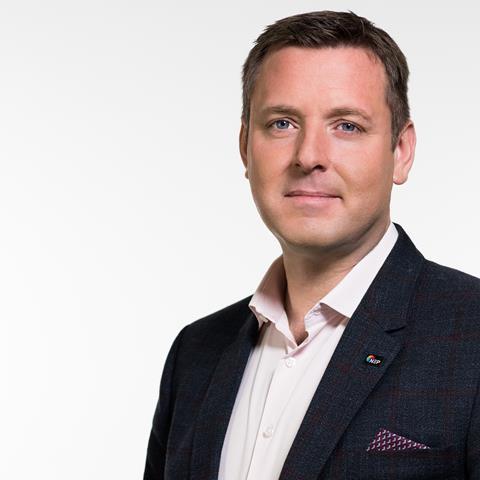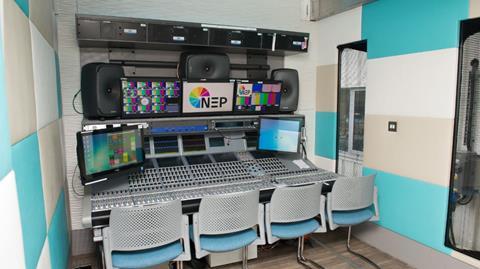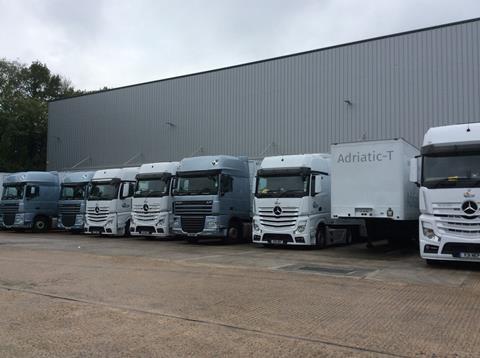NEP UK champions the brains behind the technology and invests in new skilled staff and kit to overcome broadcasting obstacles, says President Steve Jenkins.
The industry is faced with many challenges, from the influx of integrated technologies to a lack of skilled professionals entering the OB sector.

Steve Jenkins, President of NEP UK said: “That’s the principle challenge. We need the right people, the right skills and we need to keep investing in the development of those people to help us navigate and support those challenges of our industry.”
NEP supports the global productions of live sporting events including Wimbledon, the Academy Awards and it will provide facilities to support the 2018 Commonwealth Games.
Jenkins said that to successfully broadcast such events skilled staff who can operate the technology, adapt with industry changes and be flexible to client requirements are required.
“We need the right people, the right skills and we need to keep investing” - Steve Jenkins
Jenkins is passionate about developing young talent to drive innovation and offer clients the best coverage and delivery of content.
“It is quite worrying the biggest challenge facing our industry – not just NEP but industry wide – is the lack of people, the lack of diversity and the shortage of skills.
”All of those are challenges we face and that is why NEP is trying to provide future opportunity to create awareness,” Jenkins said.
Jenkins spoke to IBC365 during its annual Student Open Day at its headquarters in Bracknell, England.
The NEP UK open day encouraged young talent to opt for a career in the OB industry.
Jenkins opened the day welcoming students from Southampton, Ravensbourne, West Thames, St Crispin’s and Bracknell College. The aim, he told IBC365, is to offer insight for those who are interested in a career in the broadcast industry.
Jenkins explained the importance of a dynamic team who are eager and willing to collaborate together with the available technology.
He said: “You need people to help innovate and think through what the challenges are and help you deliver and that’s a resource which part of it is expanding the skills.”
NEP UK prioritises an importance between creating awareness of the outside broadcast industry whilst simultaneously promoting, championing and creating opportunities for young talent which has always been a core value, as talented and passionate people are a priority to a successful team.
This was apparent after a fire destroyed NEP UK’s warehouse and fleet of OB trucks. The impact of the fire was challenging, and required the re-build of trucks, premises and restocking of inventory.
Jenkins said the support from the NEP network, suppliers, clients and competitors made the recovery possible.
“I am extremely proud of where we now are 18 months on. We have rebuilt our asset base, with the industry wide support we did not lose a single client and we continue to build and grow our business,” Jenkins said.
Vendor cooperation
Choosing the right equipment to offer their clients flexible solutions, NEP requires crews that are agile and well equipped to manage the kit throughout the productions of UK reality TV programmes such as Big Brother and Love Island.

NEP used a combination of an Imagine IP3 Router, two Calrec audio desks, Telex comms systems, bespoke hot head control system with fibre optic control of various Panasonic hot heads–50 in all–along with a system of five Sony HD line cameras and a small Panasonic vision mixer to successfully deliver Love Island to audiences across the UK.
“There is an array of technologies that are evolving and discussions across our industry.
“We have 4K, 8K, HDR, Atmos, IP and there is a change and shift in the consumers viewing habits. All of those are things we as a collective industry have to navigate and we don’t do it just with tools and assets we do it with people,” Jenkins said.
Jenkins explained the process of selecting kit and applying it to real-world applications is collaborative.
He said: “It is important that we select technology that feeds what the clients need plus allows us to drive the utilisation, and something we can wrap our arms around and deliver. Our staff need to be able to actually use that technology.
“We constantly need to understand the technology and we also have to work within the parameters of the commerciality of it as well.”
Identifying the broadcasting objective and addressing challenges is a key priority for NEP, particularly as the company focusses on championing new talent and continuing to invigorate their OB production and delivery fleets.
“NEP is a worldwide provider of outsourced facilities and services for the serviced broadcast, media and events industries. Operations across 22 countries and work with broadcast production companies, rights holders and production creatives to capture, ingest and manipulate, manage, display and distribute content, content that is associated with many well known brands,” Jenkins said.
“Innovation is one of our core values and being a leader in the industry, you need to balance the risks and benefits around a new technology. The whole value chain has to be looked at and explored.” he said.
NEP built the first high definition mobile unit to deliver remote production, it also offers services in studio production, host broadcast as well as post production and VFX services.

“Being the leader is not where we would sit if that risked the delivery of making something work.
“We have been on the leading curve of technology but we have done that carefully, and we don’t always have to be on the leading curve of technology.”
Overcoming challenges
Outside broadcasting is a partnership between the clients, the technology and the operational expertise.
Jenkins told IBC365: “We’ve got changes in the technology, new adoption of technology and we also have changes in viewing habits. We find that there is an increase in content and making that content more accessible and managing that content is particularly important.
”The operational processes have evolved along with the technological advancements. Integrating software and IP workflows is vital.”
However, new technology doesn’t necessarily equal efficiency. Jenkins explained that often both the client and NEP are looking for the value in the technology and the value of adoption.
He said: “It’s a balance between the client’s needs, the technology value and the requirement to find talented people to support that technology. We also have the commercial elements to navigate to make sure the adoption is without risk of the delivery.”
“We work in a time-critical and highly sought after area of delivery. It’s very important the trusting relationships they have with each other. That is the critical part of success of any project we deliver.
“It’s the minds, the thinking, the innovation to make the projects grow,” Jenkins said.




























No comments yet